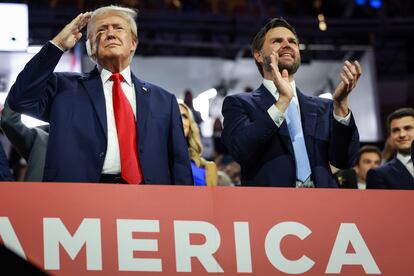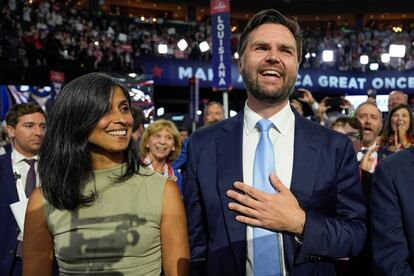Donald Trump picks Ohio Senator J.D. Vance as vice-presidential candidate
The former president has opted for a running mate based on personal loyalty, announcing the former marine and author of ‘Hillbilly Elegy’ at the Milwaukee convention


After months of cat and mouse and guessing games, Donald Trump has finally revealed his vice-presidential pick for the Republican ticket. He waited until the last moment, in the middle of the party convention in Milwaukee, to make his announcement. The former president and Republican candidate for president of the United States has selected Senator J. D. Vance to be his running mate and the next vice-president if Trump wins the election on November 5. Trump made his choice days after an assassination attempt at a rally in Butler, Pennsylvania. Since then, he has moderated his rhetoric and called for unity: unity around the figure of Donald Trump, that is to say.
“After lengthy deliberation and thought, and considering the tremendous talents of many others, I have decided that the person best suited to assume the position of Vice President of the United States is Senator J.D. Vance of the Great State of Ohio,” Trump announced on his social network, Truth Social, in a message in which he reviews his running mate’s resumé. In Vance, Trump has opted for someone young, whose loyalty he trusts, but who has been tough in his political stances, sometimes even extremist. The choice does not fit too well with the moderation the former president has promised.
The announcement came minutes before Vance’s name was to be presented to the Republican National Convention and while the delegates were voting for Trump himself, who was officially proclaimed the party’s candidate. The former president has entrusted Vance to focus on the decisive Rust Belt states of the Midwest, which, due to his origins, he represents. “J.D. has had a very successful business career in Technology and Finance, and now, during the Campaign, will be strongly focused on the people he fought so brilliantly for, the American Workers and Farmers in Pennsylvania, Michigan, Wisconsin, Ohio, Minnesota, and far beyond….,” Trump added.
Pennsylvania, Michigan, and Wisconsin are three pivotal states where Trump triumphed in 2016 and which Biden won back for the Democrats in 2020. Maintaining that so-called “blue wall” has become almost Biden’s only chance of re-election. If the current president retains them, he could cede Georgia, Nevada, and Arizona, the other three most hotly contested states.
On Monday, an hour after Trump announced his nomination, Vance appeared on the trading floor of the Fiserv Forum, where the convention is being held, dishing out hugs and autographs. Moments later, by the acclamation of the delegates, he was formally chosen as the vice-presidential candidate.
James David Vance, known as J. D. Vance, rose to fame through his memoir Hillbilly Elegy, published in 2016 and later brought to the screen by Netflix. He won the Republican nomination as a senatorial candidate in 2022 thanks to the decisive support of Trump from the political point of view, and billionaire Peter Thiel in financial terms. 39 years old, born in Middletown (Ohio), the son of divorced parents and raised by his grandparents — from whom he adopted his surname — in a poor white family in the Appalachian region, he was a Marine in his youth and served in Iraq as a combat correspondent. After studying political science and philosophy at Ohio State University, he received his law degree from Yale, where he met his wife, lawyer Usha Chilukuri, with whom he has three children.
Vance began working in a law firm but then relocated to San Francisco to move into the technology sector as a venture capitalist. He was a director of Mithril Capital, Peter Thiel’s company. His memoir, which became a bestseller, was considered key to understanding the anger of the white working class, who felt they were on the losing side of globalization and saw in Trump an opportunity for revenge. He continued his career as a venture capitalist in different firms while his interest in politics was stirred up.

Critic-turned-critic
Vance was a critic of Donald Trump during the 2016 election, becoming a member of the Never Trump movement and going so far as to call him “America’s Hitler.” Later, he deleted Twitter messages that criticized the former president, supported him in the 2020 re-election campaign and lent him his unconditional backing, especially after announcing his Senate candidacy. He has maintained that loyalty as a senator and is also very close to Donald Trump Jr. Trump himself did not pass up an opportunity to humiliate Vance in public in 2022: “J. D. is kissing my ass he wants my support so bad,” he said at a rally in Ohio during the campaign for the 2022 midterm elections.
A climate and election denier (he defends the hoax that Trump won the 2020 election, but it was stolen from him), a critic of U.S. military aid to Ukraine and a recalcitrant conservative, Vance was an evangelical Christian, but converted to Catholicism in 2019.
In the aftermath of the assassination attempt on the former president, Vance has been one of the harshest voices against Democrats, stating that the shooting was “not an isolated incident.” “The central premise of the Biden campaign is that President Donald Trump is an authoritarian fascist who must be stopped at all costs. That rhetoric directly led to President Trump’s attempted assassination,” he tweeted.
As many as a score of names had featured in the betting pools, but aside from Vance only Florida Senator Marco Rubio and North Dakota Governor Doug Burgum had gained any traction. The three were considered the unofficial finalists for the pick.
Joe Biden’s campaign greeted Vance’s nomination with a scathing attack: “Donald Trump picked J.D. Vance as his running mate because Vance will do what Mike Pence wouldn’t on January 6: bend over backwards to enable Trump and his extreme MAGA agenda, even if it means breaking the law and no matter the harm to the American people,” it said in a statement. “Vance has a reputation as one of the most far-right extremists in Washington,” it added.
In 2016, amid scandals over his sexist statements and doubts about his integrity, Trump chose Mike Pence as his running mate, a politician who defined himself as “a Christian, a conservative, and a Republican — in that order " and of whom the former president went so far as to say that he was “too honest.” Pence was on the ballot again in the 2020 election, before confronting the then-president over his requests to prevent the certification of Joe Biden’s victory in the presidential election.
Sometimes a running mate is chosen to help win a particular state or to strengthen a candidacy in constituencies where the candidate is weak. That led many to assume that Trump would pick a woman, an African-American, a Latino, or someone relatively young. Personal loyalty was another ingredient to throw into the mix, someone who was sufficiently MAGA to meet Trump’s requirements. That seems to have weighed in on the decision.

The role of the vice president
Trump, in any case, believes that the election will be won or lost by him and that it doesn’t much matter who is at his side. “Well, it’s never really had that much of an effect on an election,” he said a few months ago. After the debate against Biden on June 27 and the assassination attempt last week, perhaps that’s even more true.
The vice president’s role is also not overly prominent once in office. His or her primary responsibility is to serve as a replacement for the president in the event of the incumbent’s resignation, incapacity, removal, or death, something that has occurred relatively frequently in U.S. history. Nine vice presidents have served in this capacity.
The vice president also presides over the Senate, where they hold a casting vote in the event of a tie, something Kamala Harris had to use frequently in the first half of Biden’s term. In practice, except on exceptional occasions such as the State of the Union debate or the need to exercise a tie-breaking vote, the vice president does not usually preside over sessions. The rest of the functions are at the discretion of the president. Some vice-presidents have assumed a specific policy portfolio, while others have simply acted as senior advisors to the president.
Prior to the ratification of the 12th Amendment in 1804, electors voted only for president and the person who received the second-highest number of votes became vice president, even if he or she was from a rival party.
If Trump wins the election, the new tenant of the Naval Observatory, the residence of vice presidents since Walter Mondale during Jimmy Carter’s presidency, will also be at the forefront of the race for succession. Five vice presidents have subsequently won election to the White House.
Sign up for our weekly newsletter to get more English-language news coverage from EL PAÍS USA Edition
Tu suscripción se está usando en otro dispositivo
¿Quieres añadir otro usuario a tu suscripción?
Si continúas leyendo en este dispositivo, no se podrá leer en el otro.
FlechaTu suscripción se está usando en otro dispositivo y solo puedes acceder a EL PAÍS desde un dispositivo a la vez.
Si quieres compartir tu cuenta, cambia tu suscripción a la modalidad Premium, así podrás añadir otro usuario. Cada uno accederá con su propia cuenta de email, lo que os permitirá personalizar vuestra experiencia en EL PAÍS.
¿Tienes una suscripción de empresa? Accede aquí para contratar más cuentas.
En el caso de no saber quién está usando tu cuenta, te recomendamos cambiar tu contraseña aquí.
Si decides continuar compartiendo tu cuenta, este mensaje se mostrará en tu dispositivo y en el de la otra persona que está usando tu cuenta de forma indefinida, afectando a tu experiencia de lectura. Puedes consultar aquí los términos y condiciones de la suscripción digital.








































